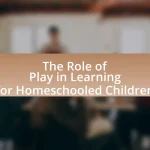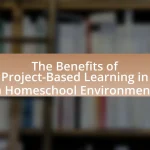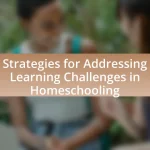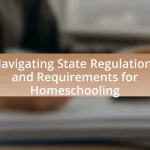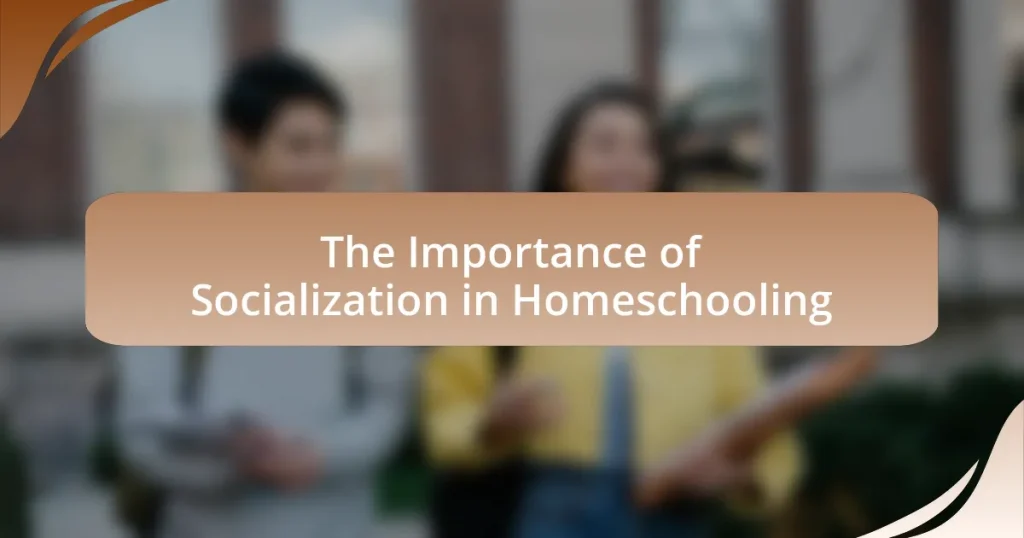The article focuses on the importance of socialization in homeschooling, highlighting its role in developing interpersonal skills, emotional intelligence, and a sense of community among homeschooled children. It discusses the critical nature of socialization, common misconceptions about homeschooled children’s social skills, and how socialization differs from traditional schooling. The article also outlines the benefits of socialization, strategies for parents to facilitate social interactions, and the challenges homeschooled children may face regarding socialization. Additionally, it emphasizes the significance of community resources and extracurricular activities in enhancing social opportunities for homeschooled students.
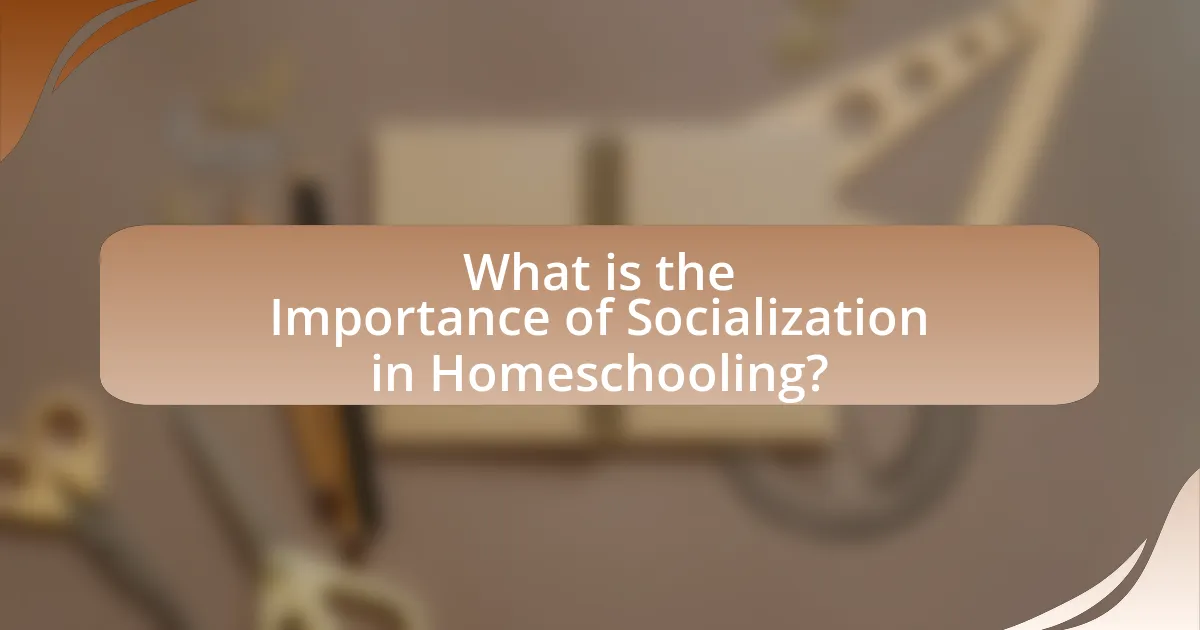
What is the Importance of Socialization in Homeschooling?
Socialization in homeschooling is crucial as it helps children develop interpersonal skills, emotional intelligence, and a sense of community. Engaging with peers through various activities, such as co-ops, sports, and community events, allows homeschooled children to practice communication, teamwork, and conflict resolution. Research indicates that homeschooled children often participate in diverse social settings, which can lead to well-rounded social skills. A study by the National Center for Education Statistics found that homeschooled students frequently engage in extracurricular activities, enhancing their social interactions and relationships. Thus, socialization is a fundamental aspect of homeschooling that contributes to a child’s overall development and prepares them for future social environments.
Why is socialization a critical aspect of homeschooling?
Socialization is a critical aspect of homeschooling because it ensures that homeschooled children develop essential interpersonal skills and emotional intelligence. Engaging with peers and adults outside the family unit fosters communication, cooperation, and conflict resolution abilities. Research indicates that children who participate in social activities, such as co-ops or community sports, exhibit higher levels of social competence and adaptability. For instance, a study published in the Journal of School Choice found that homeschooled children who regularly interacted with peers demonstrated similar social skills to those in traditional schooling environments. This evidence underscores the importance of structured socialization opportunities in the homeschooling context.
What are the common misconceptions about socialization in homeschooling?
Common misconceptions about socialization in homeschooling include the belief that homeschooled children lack social skills and do not interact with peers. In reality, research indicates that homeschooled children often engage in diverse social activities, such as community sports, clubs, and co-ops, which provide ample opportunities for socialization. A study published in the Journal of School Choice found that homeschooled students typically perform as well as or better than their traditionally schooled peers in social skills assessments, debunking the myth that homeschooling leads to social isolation.
How does socialization differ in homeschooling compared to traditional schooling?
Socialization in homeschooling differs from traditional schooling primarily in the context and variety of social interactions. In traditional schooling, students engage with a diverse group of peers daily, fostering social skills through structured environments and group activities. Conversely, homeschooling often relies on family and community-based interactions, which can limit exposure to a broader peer group but may enhance family bonds and individualized social experiences. Research indicates that homeschooled children can develop strong social skills through extracurricular activities and community involvement, but they may miss out on the spontaneous social dynamics present in traditional classrooms.
What are the key benefits of socialization for homeschooled children?
Socialization for homeschooled children provides essential benefits, including improved social skills, emotional development, and increased confidence. Engaging with peers through various activities, such as co-ops, sports, and community events, allows homeschooled children to practice communication, teamwork, and conflict resolution. Research indicates that children who participate in diverse social settings exhibit better adaptability and interpersonal skills, which are crucial for future success. Additionally, studies show that homeschooled children often develop strong relationships with a wider range of age groups, enhancing their emotional intelligence and empathy.
How does socialization contribute to emotional development in children?
Socialization significantly contributes to emotional development in children by providing them with opportunities to interact with peers and adults, which fosters emotional understanding and regulation. Through social interactions, children learn to recognize and express their own emotions, as well as empathize with others, which is crucial for developing emotional intelligence. Research indicates that children who engage in regular social activities demonstrate better emotional regulation and are more adept at forming healthy relationships. For instance, a study published in the Journal of Child Psychology and Psychiatry found that social skills acquired through peer interactions are directly linked to improved emotional outcomes in children, highlighting the essential role of socialization in their emotional growth.
What role does socialization play in developing communication skills?
Socialization plays a crucial role in developing communication skills by providing individuals with opportunities to interact, share ideas, and practice verbal and non-verbal exchanges. Through social interactions, individuals learn to articulate thoughts, understand social cues, and adapt their communication styles to different contexts. Research indicates that children who engage in regular social activities demonstrate improved language skills and greater emotional intelligence, which are essential components of effective communication. For instance, a study published in the Journal of Child Development found that peer interactions significantly enhance vocabulary acquisition and conversational abilities, underscoring the importance of socialization in fostering communication skills.
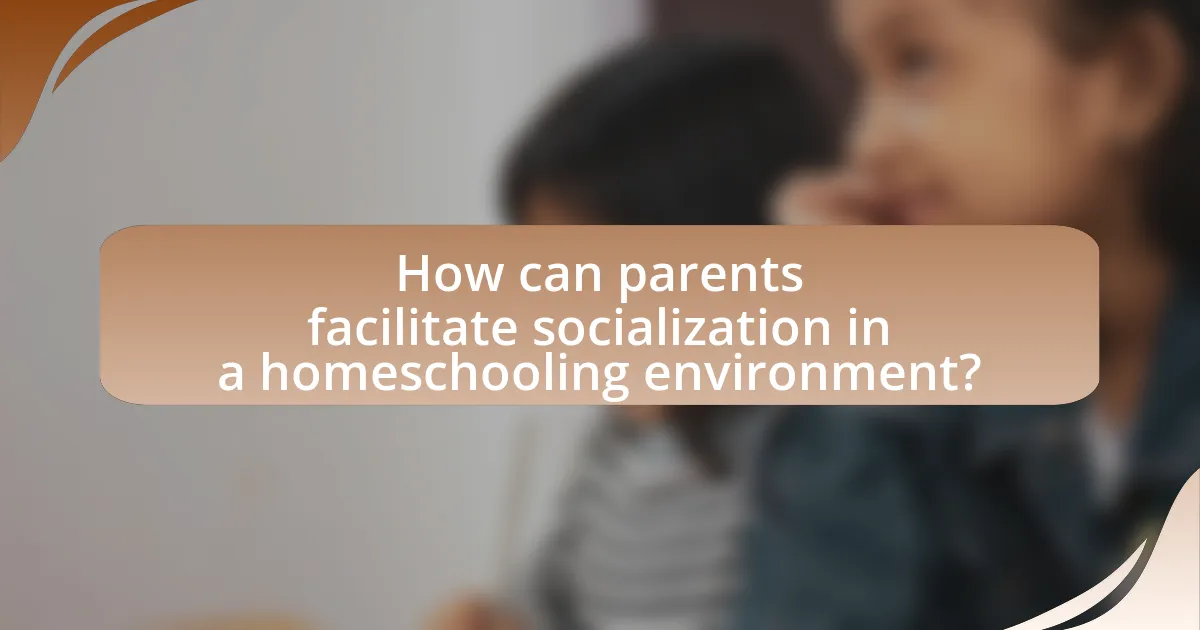
How can parents facilitate socialization in a homeschooling environment?
Parents can facilitate socialization in a homeschooling environment by actively engaging their children in community activities and group learning experiences. This can include enrolling children in local sports teams, art classes, or co-op groups where they can interact with peers. Research indicates that children who participate in group activities develop better social skills and emotional intelligence, which are crucial for effective communication and relationship-building. For instance, a study published in the Journal of Educational Psychology found that social interactions in diverse settings significantly enhance children’s social competence. By providing these opportunities, parents can ensure their homeschooled children develop essential social skills alongside their academic education.
What strategies can parents use to encourage social interactions?
Parents can encourage social interactions by facilitating playdates and group activities. Organizing regular playdates allows children to engage with peers in a familiar environment, fostering friendships and social skills. Additionally, enrolling children in extracurricular activities, such as sports teams or art classes, provides structured opportunities for socialization with diverse groups. Research indicates that children who participate in group activities develop better communication skills and emotional intelligence, which are crucial for effective social interactions. Furthermore, parents can model social behavior by demonstrating positive interactions in their own relationships, reinforcing the importance of social skills through example.
How can community resources enhance socialization opportunities?
Community resources enhance socialization opportunities by providing structured environments where individuals can interact and build relationships. These resources, such as community centers, libraries, and local clubs, offer programs and activities that encourage participation and engagement among diverse groups. For instance, a study by the National Center for Education Statistics found that students involved in community-based activities reported higher levels of social skills and peer relationships. By facilitating access to these resources, communities foster connections that are essential for social development, particularly for homeschooled individuals who may have fewer traditional socialization avenues.
What types of extracurricular activities are beneficial for homeschooled children?
Extracurricular activities that are beneficial for homeschooled children include sports, arts and crafts, music lessons, community service, and academic clubs. Engaging in sports promotes physical health and teamwork skills, while arts and crafts foster creativity and fine motor skills. Music lessons enhance cognitive abilities and discipline, and community service encourages social responsibility and empathy. Academic clubs, such as science or debate clubs, provide opportunities for intellectual engagement and peer interaction. Research indicates that participation in these activities can significantly improve social skills and emotional well-being in children, making them essential for homeschooled students’ overall development.
How can technology aid in socialization for homeschooled students?
Technology can significantly aid in socialization for homeschooled students by providing platforms for virtual interaction and collaboration. Online tools such as video conferencing, social media, and educational apps enable homeschooled students to connect with peers, participate in group projects, and engage in discussions, thereby fostering social skills and relationships. Research indicates that 70% of homeschooled students report feeling socially connected through online communities, highlighting the effectiveness of technology in bridging social gaps.
What online platforms are effective for connecting homeschooled children?
Online platforms effective for connecting homeschooled children include Facebook groups, Discord servers, and online co-ops. Facebook groups provide a space for parents to connect and arrange meetups, while Discord servers facilitate real-time communication and collaboration on projects among children. Online co-ops offer structured classes and activities, allowing homeschooled children to interact in a learning environment. These platforms enhance socialization opportunities, which are crucial for homeschooled children to develop social skills and friendships.
How can virtual meetups foster social skills in a homeschooling context?
Virtual meetups can foster social skills in a homeschooling context by providing structured opportunities for interaction among peers. These online gatherings facilitate communication, collaboration, and relationship-building, which are essential components of social development. Research indicates that children who engage in regular social interactions, even in virtual formats, demonstrate improved social competence and emotional understanding. For instance, a study published in the Journal of Educational Psychology found that children participating in online group activities showed enhanced teamwork skills and increased confidence in social settings. Thus, virtual meetups serve as a valuable tool for homeschooling families to promote essential social skills.
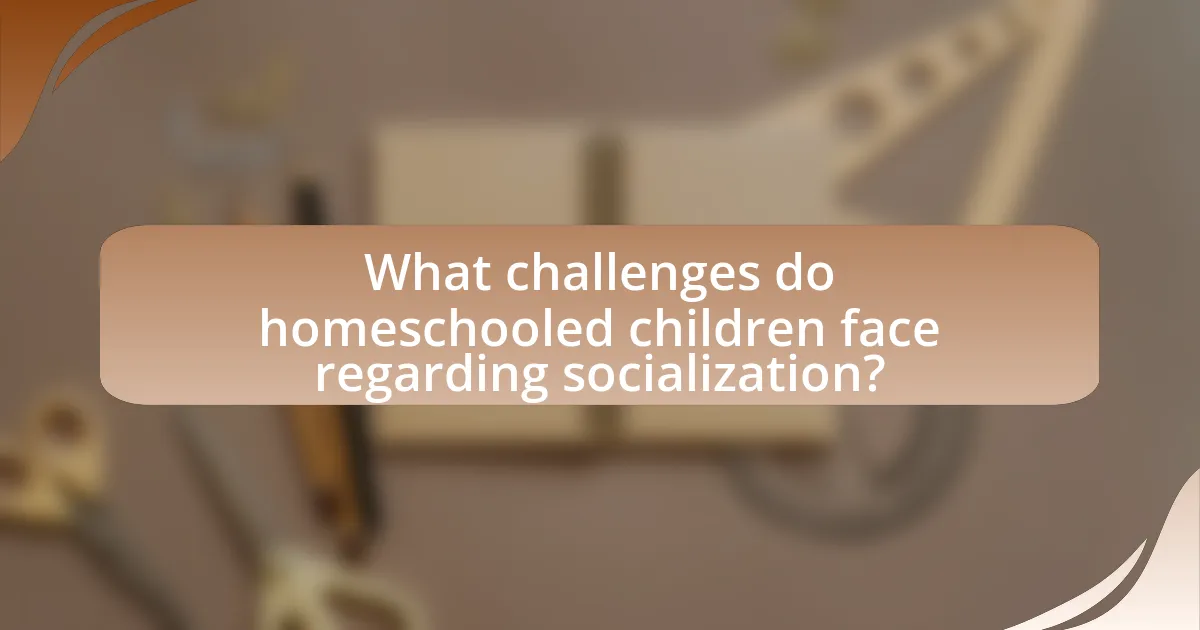
What challenges do homeschooled children face regarding socialization?
Homeschooled children often face challenges in socialization due to limited daily interactions with peers. This lack of regular engagement can lead to difficulties in developing social skills, such as communication, teamwork, and conflict resolution. Research indicates that homeschooled children may have fewer opportunities to participate in group activities, which can hinder their ability to form friendships and navigate social dynamics effectively. A study published in the Journal of School Choice found that homeschooled children reported feeling less connected to peers compared to those in traditional schooling environments, highlighting the importance of structured social opportunities for their development.
What are the potential drawbacks of limited social interactions?
Limited social interactions can lead to significant drawbacks, including social isolation, impaired communication skills, and increased mental health issues. Research indicates that individuals with limited social exposure often struggle with forming relationships and may experience feelings of loneliness, which can exacerbate anxiety and depression. A study published in the journal “Psychological Science” found that social isolation is linked to a higher risk of mental health disorders, highlighting the importance of social engagement for emotional well-being. Furthermore, limited interactions can hinder the development of essential social skills, such as conflict resolution and teamwork, which are crucial for personal and professional success.
How can parents identify signs of socialization issues in their children?
Parents can identify signs of socialization issues in their children by observing behaviors such as difficulty making friends, reluctance to engage in group activities, and frequent feelings of loneliness. These behaviors indicate challenges in social interactions, which are crucial for healthy development. Research shows that children who struggle with socialization may exhibit anxiety in social settings, have trouble understanding social cues, or prefer solitary play over group play. For instance, a study published in the Journal of Child Psychology and Psychiatry found that children with socialization difficulties often face increased risks of emotional and behavioral problems, highlighting the importance of early identification and intervention.
What solutions can address socialization challenges in homeschooling?
To address socialization challenges in homeschooling, families can engage in community activities, such as joining local homeschooling groups, participating in co-ops, and enrolling children in extracurricular activities like sports or arts. These solutions provide opportunities for children to interact with peers, fostering social skills and friendships. Research indicates that children who participate in group activities exhibit improved social competence and emotional well-being, as highlighted in a study by the National Center for Education Statistics, which found that homeschooled children involved in community activities reported higher levels of social engagement.
What are the best practices for ensuring effective socialization in homeschooling?
To ensure effective socialization in homeschooling, families should actively engage their children in diverse social activities. This includes participating in local homeschooling groups, community sports teams, and extracurricular classes, which provide opportunities for interaction with peers. Research indicates that children who are homeschooled and involved in such activities often develop strong social skills comparable to those of their traditionally schooled counterparts. For instance, a study published in the Journal of School Choice found that homeschooled children who participated in community activities exhibited higher levels of social competence. Additionally, arranging playdates and cooperative learning experiences with other homeschooling families can further enhance social interactions, fostering friendships and collaborative skills.
How can parents create a balanced socialization plan for their children?
Parents can create a balanced socialization plan for their children by incorporating a variety of social activities that include both structured and unstructured interactions. This can be achieved by enrolling children in extracurricular activities such as sports, music classes, or art programs, which provide opportunities to meet peers and develop teamwork skills. Additionally, parents should facilitate playdates and group outings with other homeschooling families to encourage social interaction in a relaxed environment. Research indicates that children benefit from diverse social experiences, as highlighted in a study by the National Center for Education Statistics, which found that homeschooled children who engage in community activities exhibit higher social skills. By ensuring a mix of activities, parents can foster well-rounded social development in their children.
What tips can help parents maintain a supportive social environment?
Parents can maintain a supportive social environment by actively facilitating social interactions for their children. This can be achieved through organizing regular playdates, joining local homeschooling groups, and participating in community events, which provide opportunities for children to engage with peers. Research indicates that children who have consistent social interactions develop better social skills and emotional intelligence, which are crucial for their overall development. For instance, a study published in the Journal of Educational Psychology found that children who engage in group activities show improved collaboration and communication skills. By prioritizing these interactions, parents can create a nurturing social atmosphere that enhances their children’s learning experiences.

